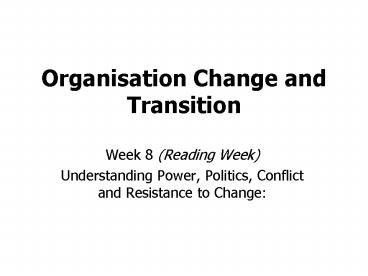Organisation Change and Transition - PowerPoint PPT Presentation
1 / 15
Title:
Organisation Change and Transition
Description:
organisational politics is about to go positive', Training Journal, August:1215. ... Theory and Design (Eight Edition), South-Western College Publishing, Ohio. ... – PowerPoint PPT presentation
Number of Views:21
Avg rating:3.0/5.0
Title: Organisation Change and Transition
1
Organisation Change and Transition
- Week 8 (Reading Week)
- Understanding Power, Politics, Conflict and
Resistance to Change
2
Lecture Structure
- Power
- Definition of Organisational Power
- Sources of Power
- Politics
- Definition of Politics
- Occurrence of Politics
- Is Political Behaviour always negative?
- Conflict in Organisations
- Definition of Conflict
- Sources and Forms of Conflict
- Managing Conflict through Negotiation
- Overcoming Resistance to Change
3
Power in OrganisationsDefinition
- ability of one person or department in an
organisation to influence other people to bring
about desired outcomes. It is the potential to
influence others within the organisation but with
a goal of attaining desired outcomes for power
holders. (Daft, 2004 493)
4
Power in OrganisationsIndividual vs.
Organisational Power
- Organisational Sources of Power
- Structure and power invested in a position
- Hierarchy levels and access to resources,
authority and responsibility
- Individual Sources of Power
- Legitimate power
- Reward power
- Coercive power
- Expert power
- Referent power
5
Power in OrganisationsVertical Sources of Power
- Formal Position
- Rights, responsibilities, and management
prerogative - Resources
- Rewards and punishments Labour market issues
- Control of Decision Premises and Information
- Top managers set guidelines or constraints for
decision making at lower levels control
information collection, interpretation and
sharing (Mgt have more) - Network Centrality
- Alliances and dependencies
6
Power in Organisations Horizontal Sources of
Power
- relationships laterally and the ability of
respective departments to impose their interests
on other departments - Dependent on strategic contingencies
- Dependency
- Financial contribution
- Substitutability
- Centrality
- Uncertainty
- Others Discretion, Visibility
7
Organisational Politics
- Behaviours that others perceive as self-serving
tactics for personal gain at the expense of other
people and possibly the organisation (McShane,
2004) - Distinctions Between Power and Politics
- Power capacity to influence individuals or
departments - Politics actual exercise of influence applied
upon individuals or departments to influence
decisions and obtain preferred outcomes
8
Organisational Politics
- In evidence when
- Uncertainty is high and there is disagreement
over goals and resource allocation - Managers confront non-programmed decisions
- Structural change Management succession
Resource allocation - Traditionally seen as negative and efforts
exerted to banish political behaviour - Question Is there constructive potential in
Politics? - Reading Holbeche (2004), Buchanan and Badham
1999 (Course Website) Bancroft Turner and Morley
(2002) (Handout).
9
ConflictConditions for Inter-group Conflict
- Conflict is a process which begins when one
party perceives that another party has negatively
affected, or is about to negatively affect,
something the other party cares about (Huczynski
and Buchanan, 2004 791) - Identify with one group and perceive that other
groups may block their goal achievement - Horizontal Conflict
- Lateral conflict among sub-units or departments
at similar hierarchical levels. - Vertical Conflict
- Control Power Goals Compensation
10
Sources of ConflictWhy does it exist?
- Operative goal incompatibility
- incompatibility between groups
- Differentiation
- differences in orientations among managers of
different factional departments - Task interdependence
- dependence of one unit on another for materials,
resources, or information - Limited resources
- competition for scarce resources
- Others Personal Factors, Culture, Communication
11
ConflictHow can we see it?
- Individual
- Sabotage
- Whistle blowing and ethical dilemmas
- Work manipulation
- Misusing and stealing resources (cyber loafing
Lim, 2002) - Political behaviour
- Absenteeism and LTO
- Group
- Strikes and lockouts
- Working to rule
- Factionalism
12
Conflict Conflict Handling Strategies (Thomas
1976)
High
Competitive or authoritarian
Collaborative and problem solving
Self Assertion
Compromise
Avoidance
Smoothing or accommodating
Low
High
Co-operation
13
Resistance to ChangeThe relevance of Conflict,
Power and Politics
- Conflict, Power and Politics indisputable aspects
of social and organisational life - Challenge is to ensure that each is used in
positive ways to enhance change an reduce
resistance - Resistance to change found at three levels
- Individual (Uncertainty and insecurity, selective
perception and retention, Habit) - Group (Group norms, Group Cohesiveness,
Groupthink) - Organisational (Power, Politics and Conflict,
Functional differentiation, Structure and
Culture)
14
Resistance to ChangeOvercoming Resistance to
Change
- Huse (1975)
- Perceived personal benefit
- Involvement of Leader/supervisor
- Provision of information
- Shared perception of need to change
- Participation and involvement (we not them and
us) - Group cohesiveness
- Targeting on-going work groups rather than
temporary groups - Open communications
- Kotter and Schlesinger (1979)
- Education and Communication
- Participation and involvement
- Facilitation and support
- Negotiation and agreement
- Manipulation and cooption
- Explicit and Implicit coercion
15
References
- Bancroft-Turner, D. and Morley, D. (2002) Psst!
Dont tell anyone but organisational politics
is about to go positive, Training Journal,
August1215. (Class Handout). - Buchanan, D. and Badham, R. (1999) Politics and
Organisational Change The Lived Experience,
Human Relations, 52(3)609 (Available on Course
Website) - Daft, R. L. (2004) Organization Theory and
Design (Eight Edition), South-Western College
Publishing, Ohio. - Holbeche, L. (2004), The power of constructive
Politics, Roffey Park Institute Publications
(Available on Course Website) - Lim, V.K.G. (2002) The IT way of loafing on the
job cyberloafing, neutralising and
organisational justice, Journal of
Organisational Behaviour, 23 675-694 - McShane, S.L. (2004) Canadian Organizational
Behaviour (Fifth Canadian Edition), Toronto,
McGraw-Hill Ryerson Limited. - Thomas, K.W. (1976) Conflict and conflict
management, in Dunnette, M.D. (ed) Handbook of
Industrial and Organisational Psychology,
Chicago Rand McNally































